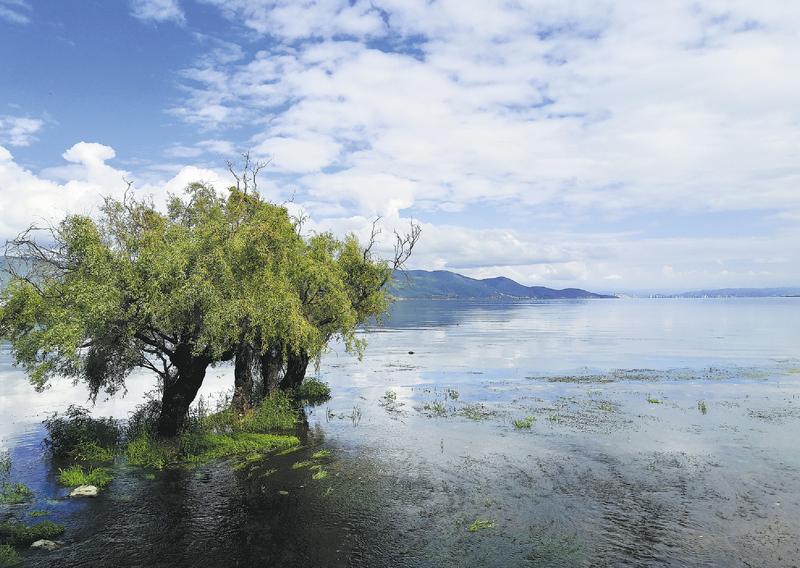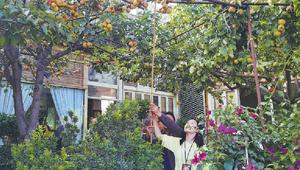After years of hard work, changes and personal sacrifice by the local residents, Erhai Lake is seeing a cleaner, healthier future, Wang Ru and Li Yingqing report in Dali, Yunnan province.
 Erhai Lake viewed from Gusheng village, hometown of rural resident He Licheng in Dali Bai autonomous prefecture, Yunnan province. (WANG RU / CHINA DAILY)
Erhai Lake viewed from Gusheng village, hometown of rural resident He Licheng in Dali Bai autonomous prefecture, Yunnan province. (WANG RU / CHINA DAILY)
Gusheng village resident He Licheng still remembers when he was young, Erhai Lake in Dali Bai autonomous prefecture, Yunnan province, was so clean that he usually drank water directly from the lake.
"There were not many people living by the lake, and nobody threw rubbish or discharged sewage into it, so the water remained grade I, the top in the country's five-tier water quality system."
Although we have suffered a few times over the years, with the improving water quality, more travelers come to Erhai Lake, and my business is getting better
He Licheng, local resident, Dali Bai autonomous prefecture, Yunnan province
In the 1980s, however, the water quality of the lake deteriorated and "we no longer drank the water", he says. In 1996, he even witnessed a massive outbreak of blue-green algae which "made the water smell terrible, and I felt heart-broken".
Recalling the past, the now 52-year-old who grew up by the lake says, "I experienced several start-overs in my career, and they are all related to the protection of Erhai Lake."
As the seventh-largest freshwater lake in China, Erhai Lake has a watershed area of 2,562 square kilometers, and more than 860,000 people are living in the area now, according to Yang Chu, a deputy mayor of Dali city.
Born into a fisherman's family, He started to go fishing with his parents in 1983 when he was 15, living on the money he made from selling fish. In 1989, He rented a 1.13-hectare tidal flat near the lake, and built it into a fishpond to raise fish with his savings.
He was earning around 3,000 yuan (US$438.3) a year at that time. He worked very hard, and, by 1993, was able to upgrade from a small wooden boat to a big powerboat in 1993 with the 20,000 yuan he saved.
However, just three years later, when the blue-green algae appeared in 1996, the local government issued a ban on using such vessels in a bid to control fishing and prevent pollution in the lake. He was unable to sell his powerboat for more than the price of scrap metal, and upon receiving compensation of 2,000 yuan from the government, he turned his back on making a living through fishing.
 Gusheng village resident He Licheng in his homestay. His career has started over several times as a result of the area's ongoing effort to protect Erhai Lake. (PHOTO PROVIDED TO CHINA DAILY)
Gusheng village resident He Licheng in his homestay. His career has started over several times as a result of the area's ongoing effort to protect Erhai Lake. (PHOTO PROVIDED TO CHINA DAILY)
Four years later, in a bid to protect the lake's surrounding wetland, He was required to remove the pond he had run for 11 years, and was compensated 28,000 yuan.
"My 11 years of effort seemed to be in vain. The loss was hard to calculate. It was really hard for me to accept at first, but gradually I did and persuaded myself to start over in my career," says He.
He converted his family home by the lake into a homestay in 2012. As the only homestay in Gusheng village at that time, He was drawing an annual income of more than 40,000 yuan. Following the visit of President Xi Jinping to the village in 2015, visitor numbers grew even higher, and his yearly income grew to about 200,000 yuan.
Xi's visit also made him realize the importance of protecting Erhai Lake. "President Xi told us we must protect Erhai Lake, and I began to realize that we can only develop in a sustainable way to ensure the ecology of the lake. If the lake became too polluted, we would have difficulty even living by it, let alone developing its surrounding area."
Yang says the effort to control pollution and improve water quality started in 1996, and intensified following Xi's visit in 2015.
As a result, just as his homestay business started to develop good momentum, in 2017, all the restaurants and homestays by the lake were required to close to improve their sewage treatment facilities. He invested nearly 100,000 yuan, closing his homestay for eight months, which underwent repeated inspection, to bring the sewage purification system up to regulations and gain permission to reopen.
"Those eight months were peak travel season, a rough estimate of how much income I lost is around 50,000 yuan," says He.
 Travelers pick pears at He's homestay in Dali. (LI YINGQING / CHINA DAILY)
Travelers pick pears at He's homestay in Dali. (LI YINGQING / CHINA DAILY)
In 2018, the 1,806 residents that lived in the core area of Erhai Lake nature reserve were required to move out, and some buildings were demolished. He found part of his homestay was inside the boundary of the reserve, so he had to demolish part of his courtyard and house totaling 156 square meters.
But this time, He found it easier to accept the loss. "I got to know the government's plan to build an ecological corridor, a natural waterfront, lined with trees, grass, ditches and wetland, which would allow the pollutants from the rain-wash or the runoff from the fields to be retained at the lake shore. I know it will help to greatly improve water quality.
"Although we have suffered a few times over the years, with the improving water quality, more travelers come to Erhai Lake, and my business is getting better," says He.
According to Wang Xinze, a professor at Shanghai Jiaotong University's Dali Research Institute, to improve Erhai Lake's water quality, they first considered the lake itself, cancelling powerboats and fishponds. Then they sought to control pollution in the drainage area. Now they focus on how people's lifestyles influence the lake.
"An important question we need to consider is how to find a way to make people live in harmony with the lake, so that it can be protected without impacting the development of economy in the watershed area," he adds.
"In recent years, water quality of Erhai Lake has fluctuated between grade II and grade III. Our goal is to have it remain at grade II all the year round. Currently we get that for seven months, and the remaining five are grade III. Although we have done a lot of work, we still need more time to achieve our goal," says Wang.
Recalling the past, He says, "I have experienced most of the measures put in place to protect Erhai over the past 38 years. It was really hard for me to give up my boat, remove the pond and demolish houses, but considering that they can help protect Erhai Lake, which will be beneficial to our offspring, I believe my sacrifices are worthwhile. I can see Erhai is cleaner than before, so our life will get better."
Chen Yuehua contributed to this story.
Contact the writers at wangru1@chinadaily.com.cn


